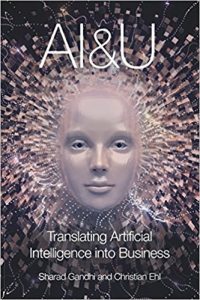
Artificial Intelligence (AI) is coming of age. In his blog article, the WFSJ board-member, Wolfgang Goede, looks into the opportunities and risks of AI. A conundrum: Can machines ever become ethical?
First of all, are robots a threat to us, journalists? This question was raised at the recent New Year Reception of the Bavarian Journalists’ Association at Munich’s International PressClub. It’s a fact that bots are increasingly being utilized in the media. So far in routine jobs, such as writing short news, keeping track of the weather, compiling sports results and stock exchange flows, or election results, as “Washington Post’s” Heliograph. Can AI take over news rooms and science desks in the near future?
“No worry, relax”, recommended Sharad Gandhi, physicist, IT engineer and technology philosopher. Principally, AI is still at the start and has only covered a few meters on a 42-kilometer marathon. So far, it analyzes data, compares patterns and detects similarities, explained Gandhi, India-born, with an impressive IT career around the world and co-author of “AI & U. Transforming Artificial Intelligence in Business”.
CURRENT AI IS STUPID
Gandhi pointed to health. “Evaluating masses of data, AI can detect skin cancer much faster and much more accurate than any dermatologist”, he said. But AI is stupid, asks no questions, takes no decisions, only does what it has been programmed to do.
 “Good journalists are creative, apply humor, use analogies and pictures”, Gandhi told some 90 attendees. He can’t see how AI can match this human intelligence, at least in the foreseeable future. AI is well suited to relieve journalists from routine, so they may concentrate on investigative work, Gandhi suggested.
“Good journalists are creative, apply humor, use analogies and pictures”, Gandhi told some 90 attendees. He can’t see how AI can match this human intelligence, at least in the foreseeable future. AI is well suited to relieve journalists from routine, so they may concentrate on investigative work, Gandhi suggested.
Not everyone in the crowd was convinced. The IT specialist is thoroughly positive about AI and technology. In the past history, it always has been disruptive, as will be AI, he explained. Countries which embrace it, such as China or India, will progress with it, surf on this innovation wave, create new opportunities and become the world’s technological and economic champions.
MOST DRAMATIC CHANGE
Skeptic Germans, however, are concerned that AI infringes on people’s liberties, spies on their private lives and exploits personal data. They are missing the ethics in the public AI debate, which they believe is driven by big money and the greed to make even more money. What’s behind it, a valid concern, German Angst – or ignorance?
Incidentally, a few days after the PressClub event the “stern” magazine addressed the issue with Germany’s top-notch science journalist Ranga Yogeshwar on the cover, like Gandhi also born in India, but with a different approach. “We’re heading into the most dramatic change in our history, but politicians keep silent, everyone is sleeping”, Yogeshwar criticizes. Nobody knows whether the automobile industry will survive and an awful lot of jobs are at stake. According to a recent McKinsey study, automation will cost 30 percent of the jobs worldwide by 2030.
FIRE OF INNOVATION
“We’ll have to say goodbye to our traditional understanding of labor and need to come up with new rules”, demands Yogeshwar. ASAP! While the telephone took 75 years to have 100 million users, Facebook did this in four years, Whatsapp and Instagram only in two years time, he adds. “The fire of innovation burns all over the planet”, but Germans are too self-complacent, unable to keep pace with competitors.
India disposes of one million software developers, whereas Germany will have hundred thousands of vacancies in the next years. “And what do we do?”. “Nothing”, answers Yogeshwar his own question. What happens in the schools? Again, “nothing”. While the Indian Infosys company trains every year 20 000 new software specialists, hungry for new knowledge and the desire to form our future. These young trainees know it’s their unique chance to get ahead in this world.
AVERT TOTALITARIAN CONTROL
Yogeshwar is explicit about pinpointing AI’s risks. That with a lack of data protection mankind could be threatened by totalitarian control. And if only minorities profit from digitalization more and more citizens will feel that they belong to the losers. Which results in what happened already in UK (Brexit) and the US (Trump): protectionism, nationalism, racism. Not to speak about China. Which develops a digital profile of reliable citizens. Critical citizens – unwanted?
Which raises the question, again and more demanding: What are ethical standards for AI, which not only Germans but many Europeans feel concerned about. Ethics and moral, in light of the fact that AI with rapidly increasing computing power might get to the point to make own autonomous decisions. For example in automatically driving cars. Experts say that with an increase of freedom machines will need a moral codex.
IN-BUILT SENSE OF GUILT
Enlightening what the London Economist found in a recent cover story “Teaching Robots right from wrong”. Ron Arkin, Georgia Tech, says that intelligent machines need an inbuilt sense of guilt, an awareness of its action and a knowledge if a norm has been violated, coupled to the desire to return to a former state.
Arkin’s colleague, Mark Riedl, thinks that this can be achieved by using stories, having AI read “a hundred stories about stealing versus not stealing” and have it “examine the consequences, understand the rules and outcomes, and begin to formulate a moral framework based on the wisdom of crowds”.
WHO DEFINES STEALING
 But is the crowd always right? How are we defining the act of stealing, especially in economic scales? Exploitation of natural resources, to the disadvantage of indigenous tribes, i.e. in Colombia? Our ten commandments, do they provide sufficient ethical standards?
But is the crowd always right? How are we defining the act of stealing, especially in economic scales? Exploitation of natural resources, to the disadvantage of indigenous tribes, i.e. in Colombia? Our ten commandments, do they provide sufficient ethical standards?
For the time being, Riedl takes a pragmatic tack: “We’re never going to have a perfect self-driving car. It’s going to have accidents. But it’s going to have fewer accidents than a human.”
ETHICAL CONUNDRUM
So far, so good, but which does not resolve the classical philosophical question behind his statement. What if the car has the choice, in order to avoid worse, to hit three children or three seniors. Whose lives are more precious, considering that all human beings have the same right to live? Unresolvable for humans – also for autonomous and ethically advanced machine intelligence, forever?
The author of this blog juggled with these imponderables and has come up with the science thriller “Alpha Deus”. An intelligent artificial intelligence, with ethical standards, which shall mediate in a conflict, gets into competition with another artificial intelligence and upsets the world.
 Article by Wolfgang Chr. Goede, Munich/Medellín, here with members of the Bavarian Journalists’ Association BJV (front, 2nd on the right). 14 February 2018
Article by Wolfgang Chr. Goede, Munich/Medellín, here with members of the Bavarian Journalists’ Association BJV (front, 2nd on the right). 14 February 2018
Photograph Caption above: AI discussion at Munich’s International PressClub with AI expert and book author Sharad Gandhi. (c) Maria Goblirsch
THE WFSJ BOARD ON THE BLOG
This article is part of the WFSJ Board Members on the blog series. Every week one of our Board Members will post a blog article on their experience with science journalism in their country or region.